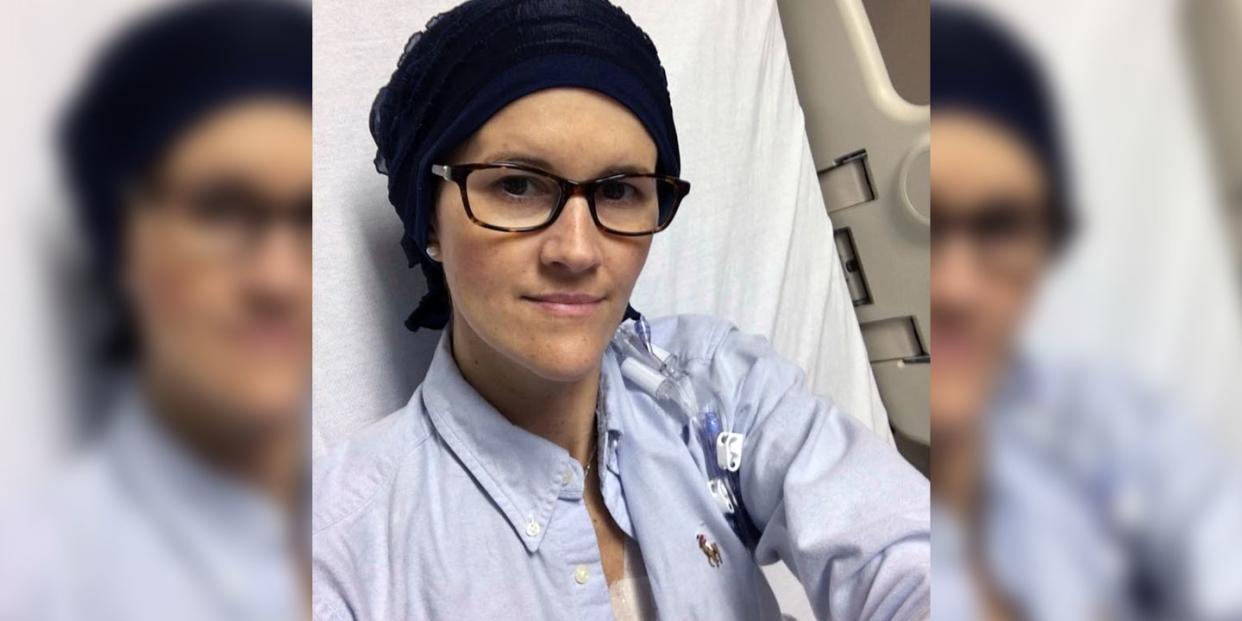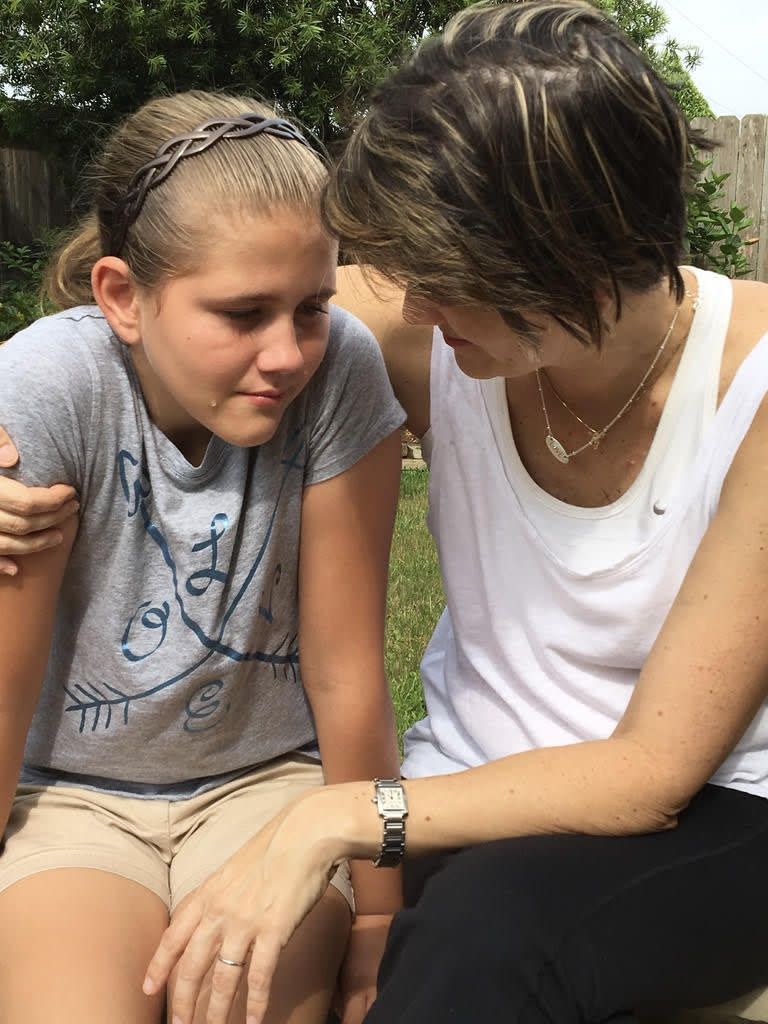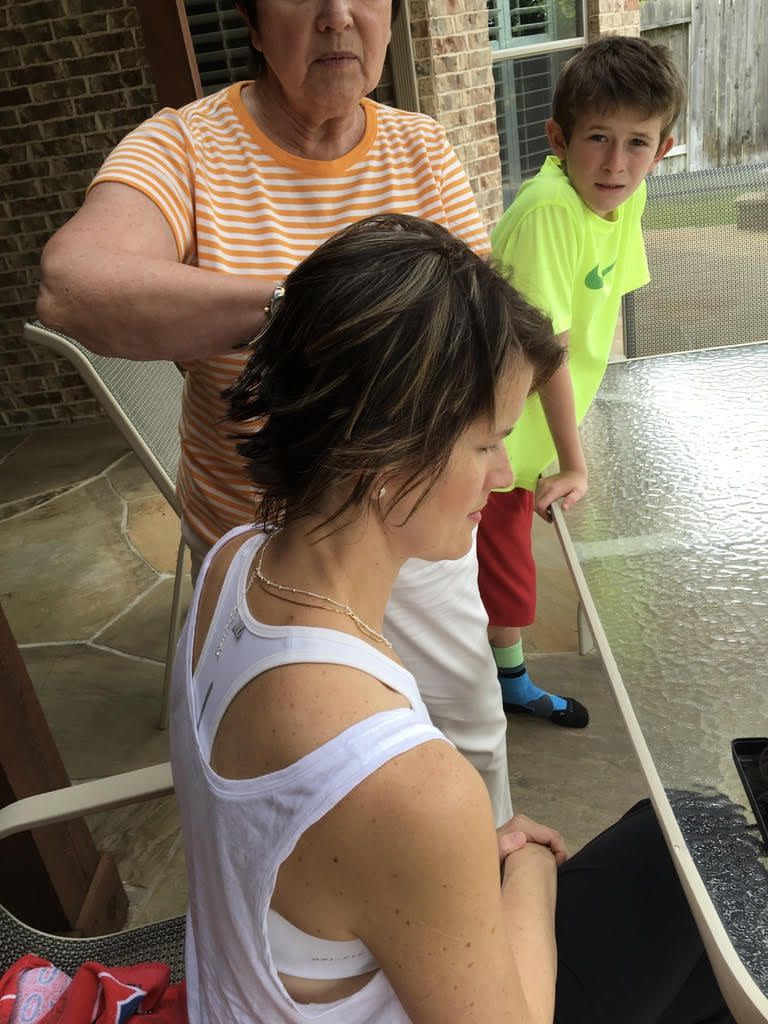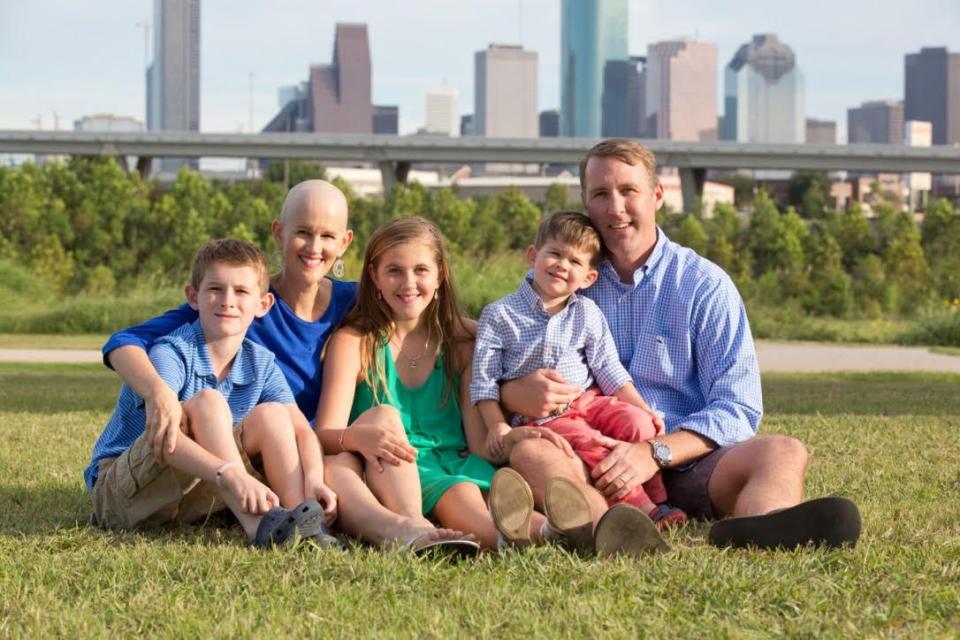‘I’m A Terminal Cancer Patient. You Are Social Distancing For Me.’

My name is Rachel Bradbury and I’m a wife, mother of three, and volunteer worker living in Houston, Texas. Four years ago, at the age of 41, I went in for my second routine mammogram and was subsequently diagnosed with breast cancer and ovarian cancer. I had a BRCA gene mutation passed down from my dad's side of the family, which put me at higher risk of developing both of these types of cancer, among many others, at a younger age. After 13 months of treatment at MD Anderson, I was cancer-free.
But about a year and a half later, my ovarian cancer came back. Because my cancer was metastatic (meaning it had spread to other parts of my body), it was terminal. This meant I could still continue treatment to potentially live longer, but in the end, my cancer was not curable.
Before the novel coronavirus outbreak hit, my life was relatively "normal," aside from the fact that I was walking around with terminal cancer. I took care of my kids and worked as a volunteer at MD Anderson advocating for cancer patients, and with a nonprofit called Ovarcome, which aims to spread the word about ovarian cancer and provide financial support for people who can’t afford treatment.
Up until a few days ago, I visited my oncologist once a month for a check-up and I took a daily chemotherapy pill. My blood cell counts aren’t as low as they’d be with traditional chemotherapy, but they’re still much lower than the average person’s. Because of this, my body is not strong enough to fight off infection.
This puts people like me in immunocompromised territory, as does my prior cancer treatment, since I have some lung scarring where I received breast radiation. So as an immunocompromised person, I’ve always had to think about where germs could be and plan my life accordingly.
Since the novel coronavirus outbreak, I’ve had to take these measures to a new level.
Last week, my kids had their spring break from school and they haven’t gone back since. My family is literally at home all day unless we need groceries (which my husband picks up via our grocery store’s curbside service), I have a doctor’s appointment (that I go to alone to avoid bringing anyone else into the hospital where they could pick something up), or we go on a walk together (while, of course, practicing social distancing).
To protect ourselves from the novel coronavirus, we wash our hands significantly more often and shower every day. We also clean our most high-traffic surfaces (like the microwave, our phones, and refrigerator handles) at least once a day. We still hug from time to time, but there’s no kissing in our household. I know that physical contact is physical contact, and we should probably stop hugging, too—I just don’t think my 6-year-old son could do that.

In the midst of this crisis, I can’t take my 15-year-old daughter to have her braces tightened because I can’t go into a high-traffic orthodontist’s office. I have to tell my 13-year-old son that he can’t play with his friends because we’re practicing strict social distancing. And my youngest can’t go to the playground because we don’t know how long this new virus may survive on hard surfaces.
Honestly, social distancing sucks for me, too. We don’t have anyone over to our house except my mom, and she has to take off her shoes at the door and wash her hands right away. I can’t go on walks with my friends anymore, and we’ve reduced our contact to texting and social media. My Pilates classes (which I used to attend religiously three days a week) are now an impossibility. I just can’t take any chances with my immune system.
I’m also deeply concerned about how the novel coronavirus pandemic could affect my access to cancer treatment.
Ovarian cancer patients regularly undergo CA-125 blood tests, which monitor the level of cancer in your body. My results recently began to show an upward tick. As a result, I had to go into the hospital a few days ago to have another scan to see if the cancer was growing. Unfortunately, the scan did show that my cancer had progressed, which means I’ll either have to go back for more chemotherapy or see if I qualify for a clinical trial.
MD Anderson, like many other cancer hospitals right now, is running a skeleton crew. Because of the novel coronavirus, many trials have been scaled back or put on hold. This is so scary for terminal cancer patients like me, as we’re dependent on new drugs or treatments. While I understand the importance of shifting our focus to the novel coronavirus, I also worry: Is this virus taking years off of my life, even if I don’t catch it?
While the hospital is taking precautions with more thorough and frequent cleaning, social distancing, stricter restrictions on visitors, and using screening questions to ID COVID-19 symptoms in visitors at every entrance, I’m still anxious that I could be exposed to the virus or something else every time I walk in.
There are so many questions running through my head: What if my doctor gets sick? Will the hospital be able to accommodate me if I need to have another scan? With all of the supply-chain disruptions we’re experiencing, is someone even making my medication right now? Is FedEx going to be able to pick it up and deliver it to me? Because the situation is constantly evolving, my doctor keeps in touch about our appointments and I follow along on the hospital’s websites for regular updates.
These are serious concerns for anyone who is currently in treatment, whether that’s for cancer, dialysis, or any other underlying medical condition. Thankfully, I do have support from my doctor and other cancer patients in my age group who understand all that I’m going through. It really helps to have someone there to say, "If it’s ever too much, just call me." These days, I feel like it's "too much" often.

As my family and I hunker down for who knows how long, I’m so thankful for anyone who is voluntarily facing the challenges that staying at home brings.
The truth is, there are people whose lives depend on social distancing. I truly cannot survive without it.
Right now, many people in my life are doing everything they can to help. But seeing tons of kids still partying on spring break, and so many others not taking the situation seriously, is really starting to irritate me. When I see individuals still trying to find little loopholes to live their lives as if nothing’s at stake, I have to think, do they know they’re putting other people at risk, or do they just think they’re not?
I get that it’s easy to think that only older people are susceptible to this infection, but that’s not true. There are people of all ages at a higher risk of catching this infection, whether that’s due to an underlying condition like cancer or lung disease, or another factor we may not even know about yet. Even if you’re young and healthy, every time you go somewhere (even the store, to be honest), there’s the potential that you could pick up novel coronavirus, spread it, and not even know about it (since it can take up to 14 days for symptoms of COVID-19 to appear, and you can have it and never show symptoms).

My message is simple: Social distancing doesn’t work unless everyone does it. I say this fully recognizing that there are a huge number of people who make their living paycheck to paycheck by working outside of their home or by relying on customer traffic. I don’t have an answer to how we can deal with this, and I truly wish we did. What I do know is that the sooner we stop the spread of this virus, the sooner we can all get back to our "normal" lives.
If you’re antsy to get out of your house, go give blood. There is a severe blood shortage, and all other health emergencies aren’t on hold just because of a new virus. Otherwise, please stay home.
You Might Also Like

